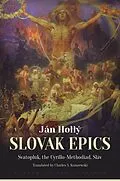The mid-nineteenth century was a time of political and cultural ferment in the Slavic lands of the Austro-Hungarian empire. The Czechs in the west, and the Slovaks in the east of the dual monarchy were striving to preserve their ethnic identities against centralising tendencies of Germanisation and Magyarisation. Literature played an important role in this 'national revival'. This was especially true of Slovakia, where the attention of poets and philologists was not merely on fostering the native language, as amongst the Czechs, but on the question of which language to foster. Should they coalesce linguistically with the kindred Czechs, or develop regional dialects into a national, Slovak language?
Ján Hollý (1785-1849), one of the greatest Slovak poets of the Romantic age, laid a sturdy foundation for the construction of modern Slovak nationhood with his three epic poems: Svatopluk (1833), the Cyrillo-Methodiad (1835), and Sláv (1839). These works both prove the suppleness and power of Slovak as a linguistic medium capable of great poetic expression and remind the Slovaks, and the world at large, of the glory that was the mediaeval Great Moravian Empire (Svatopluk), the roots of the Slovaks and Moravians in European culture (the Cyrillo-Methodiad), and the signal role of the Slavs in creating a vibrant, humanistic culture in early Central Europe (Sláv). Hollý emphasises the Slovaks as a nation in their own right, while extending a fraternal hand toward the other Slavic nations, upon whom he lavishes equal praise.
With The Slovak Epics, Glagoslav presents the reader with the entirety of Ján Hollý's three epic poems translated and introduced by Charles S. Kraszewski. All who are interested in Slovak literature, the poetry of the Romantic Era in general, and Slavic reciprocity and unity, will find The Slovak Epics worth reading.
This book was published with a financial support from SLOLIA, Centre for Information on Literature in Bratislava.
Autorentext
Ján Hollý (1785-1849) is one of the greatest writers of the Slovak národné obrodenie [national revival] of the nineteenth century. As a poet and translator, he is the most renowned author of the early period of Bernolákovcina - that codification of the modern literary language of the Slovaks, based on the western dialects of the nation worked up by Anton Bernolák. Although the language would shortly gravitate toward the central dialects, as established by those grouped around Ludovít stúr, Hollý continued to be revered by all Slovaks, a process which began during his lifetime. Hollý's first great work was a complete translation of Virgil's Aeneid (1828), which he composed following his first venture into translating the classics (Various Heroic, Elegiac, and Lyrical Poems, 1824), which groups together his Slovak versions of Ovid, Theocritus, Homer, Horace, and other Greek and Latin poets. The great Slovak epics - arguably his most important contribution to Slovak literature - are Svatopluk (1833), The Cyrillo-Methodiad (1835), and Sláv (1839). Both of the first are based on episodes from the early mediaeval period of his nation, while the last is a foray into the mythical regions of ancient Slavdom. His later lyric poetry includes idylls and hymns (Hollý was a Catholic priest). While much of his work was composed along neoclassical lines, his importance for the ideological development of Slovakia as an ethnically-based nationality, and his forays into the then-popular currents of Pan-Slavism, place him eminently amongst the great European Romantics.
